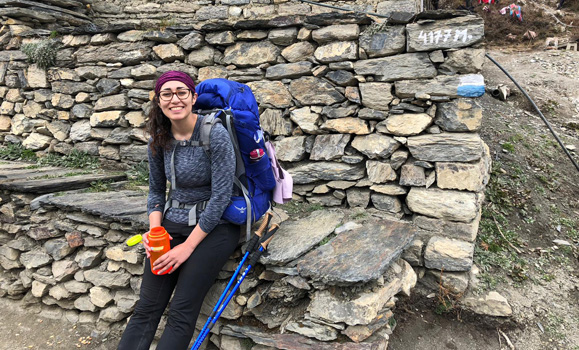This article is part of a series focusing on recipients of Dalhousie's 2020 Board of Governors' Awards — the university's top student life achievement award.
For most students, balancing school work, a job, and a social life can eat up practically all of your time. It takes a special dedication to extend yourself to other facets of university life, including student societies, communities, sports and volunteering.
This is why Maya Biderman, a Masters of Psychiatry Research student at pilipili¬˛ª≠ and a recent recipient of the Board of Governors‚Äô Award, stands out among her peers. In the past six years, the amount of organizations and causes to which she has given her time is staggering.
Ã˝
“In Judaism, there are principles of tikkun olam and tikkun adam: bettering yourself and bettering the world around you,” says Maya. “One important way to do this is through tzedakah – giving of yourself. While this is traditionally done through financial donations, that didn’t always feel feasible to me as a student. And so, volunteering my time became an important, grounding part of my weekly routine.”
Ã˝
While at pilipili¬˛ª≠, Maya has been a member of student societies and communities such as the Indigenous Health Interest Group, the Kinesiology Society, the Rowing Club, and Period @ Dalhousie, an organization that provides menstrual hygiene products to homeless shelters in Halifax. She has also been involved in numerous organizations and causes outside of the university and believes that volunteering one‚Äôs time to others can be mutually fulfilling.

Ã˝
“I talk a lot about building a village that raises you and supports you and helps shape you into the kind of person you want to become,” she says. “I’ve always wanted a big, full life. I have a lot of energy, and diverse passions, and have been really lucky to find communities that that has resonated with. I grew my community and my village to include all of those perspectives and people. It’s a gift, really.”
Being an ally
One of Maya’s most significant contributions to student life is through her work in Indigenous health. From 2017-2019, she was a non-Indigenous member and co-president of the , an organization of students that raise awareness of Indigenous health inequities.
During this time, Maya has done numerous guest lectures, facilitated focus groups, and helped develop a report available to universities nation-wide that outlines recruitment/admission policies and supports for Indigenous students. This report, in combination with cultural competency training for admissions officers, has had a specific impact on Dalhousie’s own admissions policies.
Ã˝
Outside of Dalhousie, Maya works with Heart to Heart, a youth leadership organization that brings Palestinian and Jewish citizens of Israel people together to build relationships, facilitate dialogue, and create a more peaceful society. Maya emphasizes the importance of ‚Äúallyship‚Äù and ‚Äúcross-cultural communication‚Äù for the work she does at pilipili¬˛ª≠ and beyond.
"The role of allies are incredibly important," says Maya. "There is an opportunity to use your privilege to help advocate for the need to listen to other voices, to bring in first hand perspectives. It’s a complicated, precarious position to be in – you have to constantly question your relevance in the space, the way in which you are addressing a given issue, the language you use. It has been a true honour to learn how to use my privilege to advocate alongside incredible Indigenous collaborators for the need to address gaps in our understanding of Indigenous health and history in working towards Indigenous sovereignty."
Engaging the conversation
Maya‚Äôs time at pilipili¬˛ª≠ has fundamentally changed her, but it‚Äôs safe to say she‚Äôs also helped to fundamentally change the university. Going forward she wants to see Dalhousie continue to examine its inclusion issues ‚Äúat every level of the institution.‚Äù
Ã˝
“I’ve been impressed to see how willing Dalhousie has been to engage in conversation about the need to create systemic, institutional change to address the admissions and academic experiences of Indigenous students,” she says. “I hope we continue to create an ethical space that enables those with the knowledge of how things need to change, or why they are not currently working, to share that information.”

